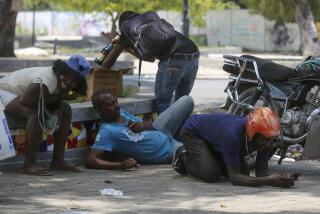Clinton Freezes U.S. Assets of Haitian Leaders
- Share via
WASHINGTON — President Clinton took steps Monday to freeze the U.S. assets of Haitian leaders resisting the Caribbean nation’s return to democracy and vowed that he will “strenuously oppose” proposed congressional amendments aimed at limiting his freedom to use U.S. troops abroad.
As U.S. warships moved into position to enforce a renewed U.N. embargo against Haiti, Clinton signed an executive order that will freeze assets of military and police officials who have blocked efforts to return President Jean-Bertrand Aristide to power, as well as any who have contributed to violence there. The freeze will also apply to the financial advisers of any of those officials and is intended to block the leaders from traveling to the United States.
Clinton also moved to head off three proposed congressional amendments intended to forestall any increased U.S. military involvement overseas. Clinton insisted that the legislation would “encroach on the President’s foreign policy powers.”
Two proposals drafted by Senate Minority Leader Bob Dole (R-Kan.) would bar the use of U.S. funds for troops in Haiti and Bosnia-Herzegovina without congressional approval, except in certain specified circumstances.
Under the 1973 War Powers Act, adopted during the Vietnam War, a President can commit combat forces abroad for up to 60 days without obtaining congressional approval.
No President, however, has recognized the act as constitutional. State Department officials said that the Dole proposal would further restrict a President’s responsibility to protect American interests and citizens abroad.
The third proposal, introduced by Sen. Don Nickles (R-Okla.), would prohibit the foreign command of U.S. troops--except by the North Atlantic Treaty Organization, in South Korea and in other specified circumstances.
But in a letter to Dole and Senate Majority Leader George J. Mitchell (D-Me.), Clinton said the restrictions could be unconstitutional. He said they could “weaken the confidence” of allies and “provide encouragement to aggressors and repressive rulers around the world who seek to operate without fear of reprisal.”
The President said the Bosnia proposal could undermine the U.S. relationship with NATO. And the Haiti proposal, he said, “could signal a green light to Haiti’s military and police authorities in their brutal efforts to resist a return of democracy, could limit my ability to protect the more than 1,000 Americans currently in Haiti and could trigger another mass exodus of Haitians.”
Clinton and top Administration aides talked to Dole and other Republicans about the proposals and were still holding out hope Monday night that the two sides might reach a compromise. Negotiations are expected to continue today.
In a session with reporters Monday, Clinton turned aside questions about whether he would consider a U.S. military intervention on the island but noted that the Haitian government “has not asked for that and does not want that.” The U.N. embargo began at 9 p.m. PDT Monday.
Clinton also defended Aristide, who has been criticized for alleged anti-democratic views and whose psychological stability was questioned in a CIA report leaked last week.
Clinton said there are Americans in the press, in Congress and elsewhere who have “questions about (Aristide’s) fitness” for the post. But, he said, Aristide has “done everything he said he would do” under the negotiated agreement to return him to power.
And he praised the exiled president for forging a relationship with transitional Prime Minister Robert Malval.
Malval, a businessman and member of the Haitian elite, “is plainly one of the ablest people in the country and a stable and reassuring figure,” Clinton said.
The asset freeze may pinch some Haitians but is not likely to have as much effect as U.S. officials might like.
Many of the Haitian leaders probably moved their assets elsewhere in the world long ago. Many may have done so after the earlier asset freeze that was in force between June and August.
A Treasury official said the United States expects to restrict assets of between 40 and 50 Haitians immediately, adding more later. The freeze will apply to U.S. financial institutions and to the Haitian branches of two U.S. banks, Citibank and Bank of Boston.
Many members of the Haitian elite are said to own real estate in southern Florida.
When the U.S. government imposed the last freeze, assets of 83 individuals and 35 companies were identified. But by the time restrictions were lifted in August, the assets of just 12 individuals had been frozen.
Also Monday, U.S. officials said they have temporarily stopped the practice of returning fleeing Haitians to their homeland.
Secretary of State Warren Christopher, talking to reporters Monday, defended the Administration’s handling of crises in Haiti, Somalia and Bosnia. Each crisis, he said, began during the Administration of former President George Bush.
He conceded that the situation in Somalia has proved to be “more difficult . . . than we anticipated.”
But he added: “I would say with a good deal of confidence that President Bush would have found the same difficulty.”
On Capitol Hill, Assistant Secretary of State Alexander Watson came in for sharp questioning on Clinton’s emerging Haitian policy. Democrats as well as Republicans suggested that the Administration is on the verge of committing troops to a situation that could be as difficult to deal with as Somalia.
Times staff writers Norman Kempster and Michael Ross contributed to this story.
* MILITARY ULTIMATUM: Haiti’s military demands a say in the new government. A10
More to Read
Sign up for Essential California
The most important California stories and recommendations in your inbox every morning.
You may occasionally receive promotional content from the Los Angeles Times.











